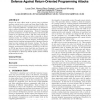Free Online Productivity Tools
i2Speak
i2Symbol
i2OCR
iTex2Img
iWeb2Print
iWeb2Shot
i2Type
iPdf2Split
iPdf2Merge
i2Bopomofo
i2Arabic
i2Style
i2Image
i2PDF
iLatex2Rtf
Sci2ools
116
click to vote
CCS
2009
ACM
2009
ACM
Dynamic integrity measurement and attestation: towards defense against return-oriented programming attacks
Despite the many efforts made in recent years to mitigate runtime attacks such as stack and heap based buffer overflows, these attacks are still a common security concern in today's computing platforms. Attackers have even found new ways to enforce runtime attacks including use of a technique called return-oriented programming. Trusted Computing provides mechanisms to verify the integrity of all executable content in an operating system. But they only provide integrity at load-time and are not able to prevent or detect runtime attacks. To mitigate return-oriented programming attacks, we propose new runtime integrity monitoring techniques that use tracking instrumentation of program binaries based on taint analysis and dynamic tracing. We also describe how these techniques can be employed in a dynamic integrity measurement architecture (DynIMA). In this way we fill the gap between static load-time and dynamic runtime attestation and, in particular, extend trusted computing techniq...
CCS 2009 | Return-oriented Programming | Return-oriented Programming Attacks | Runtime Attacks | Security Privacy |
| Added | 12 Aug 2010 |
| Updated | 12 Aug 2010 |
| Type | Conference |
| Year | 2009 |
| Where | CCS |
| Authors | Lucas Davi, Ahmad-Reza Sadeghi, Marcel Winandy |
Comments (0)

